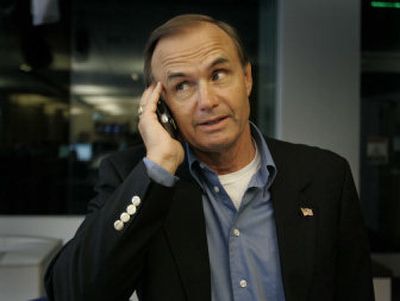GOP not out of the woods yet

WASHINGTON – The Republican victory in a closely watched San Diego-area House race showed that even in a hostile political environment, the GOP can defend its strongholds against a stiff Democratic challenge.
The result, however, shed little light on what seems the key question in November’s election: Can Republicans keep their House majority by also holding on to enough seats in districts more evenly balanced between the two parties?
Throughout Washington, GOP officials on Wednesday shared a widespread sense of relief after Republican Brian Bilbray defeated Democrat Francine Busby in Tuesday’s vote to succeed former Rep. Randy “Duke” Cunningham, R-Calif., who resigned from office after pleading guilty to corruption charges last year.
Most analysts cautioned against reading too much into a race that amounted to Republicans holding serve by retaining control of a district that has voted reliably Republican in the past.
But the outcome may have demonstrated the limits of Democrats’ ability to parlay President Bush’s unpopularity and the public’s disdain for a scandal-racked Congress into concrete gains in districts that have leaned toward the GOP.
“The fact is, there are no moral victories in American politics; either you win or you don’t,” said Rep. Tom Reynolds, R-N.Y., chairman of the National Republican Congressional Committee.
Bilbray’s victory denied Democrats what they had been seeking most from the race – evidence that the bleak poll numbers for Bush and Congress will translate into the same sort of voter backlash that gave the GOP control of Capitol Hill in 1994.
By the same token, independent political analyst Stuart Rothenberg cautioned that Republicans still have their work cut out for them in this year’s campaign.
“They would be deluding themselves if they took this as evidence there was no … mood for change,” Rothenberg said.
Indeed, in Montana, Democratic voters showed a willingness to shake the status quo in choosing their candidate to run against GOP Sen. Conrad Burns, who is in political trouble because of his links to disgraced former lobbyist Jack Abramoff.
Democratic voters soundly rejected an establishment candidate, John Morrison, embroiled in a scandal of his own in favor of a nominee, state Sen. Jon Tester, who appears better equipped to make ethics an issue against Burns.
The California result was sufficiently mixed to justify optimism and concern in each party.
As Reynolds’ comment made clear, Republicans were cheered by the bottom line – they held the seat. Busby fell short even though Cunningham’s legal troubles and Bilbray’s experience as a lobbyist – a profession besmirched by the Abramoff scandal – made California’s 50th District about as an ideal an environment as Democrats could have wished for to promote their political reform message.
Some analysts blamed Busby’s loss on a gaffe during the campaign’s final days, when at a rally she seemed to be encouraging illegal immigrants to vote.
Democrats took heart from the money and manpower Republicans had to pour into winning in a district where traditionally elections have been a cakewalk for the GOP.
Bush, first lady Laura Bush, Vice President Dick Cheney and Sen. John McCain, R-Ariz., all taped telephone messages urging voters to back Bilbray. The National Republican Congressional Committee spent at least $4.5 million.
“They don’t have the money to spend $4- or $5 million to defend every seat” that could be competitive this fall, said Democratic pollster Mark Mellman.
Democrats also were heartened that Bilbray was held to about 49 percent of the vote in a district Bush won with 55 percent in 2004.
If Republicans in more closely balanced districts run that far behind Bush’s ‘04 tallies in this November’s vote, Democrats could gain the 15 seats they need to recapture the House.
Rothenberg and other analysts said Busby’s showing should be most sobering to Democrats arguing that this year’s atmosphere of discontent would allow the party to significantly “expand the battlefield” into traditionally Republican-leaning districts.
The Bilbray-Busby race “tells us Republicans aren’t voting Democratic; we know that,” said Rothenberg. “But what about Democrats who have been voting for Republican candidates? It doesn’t tell us a lot about that.”